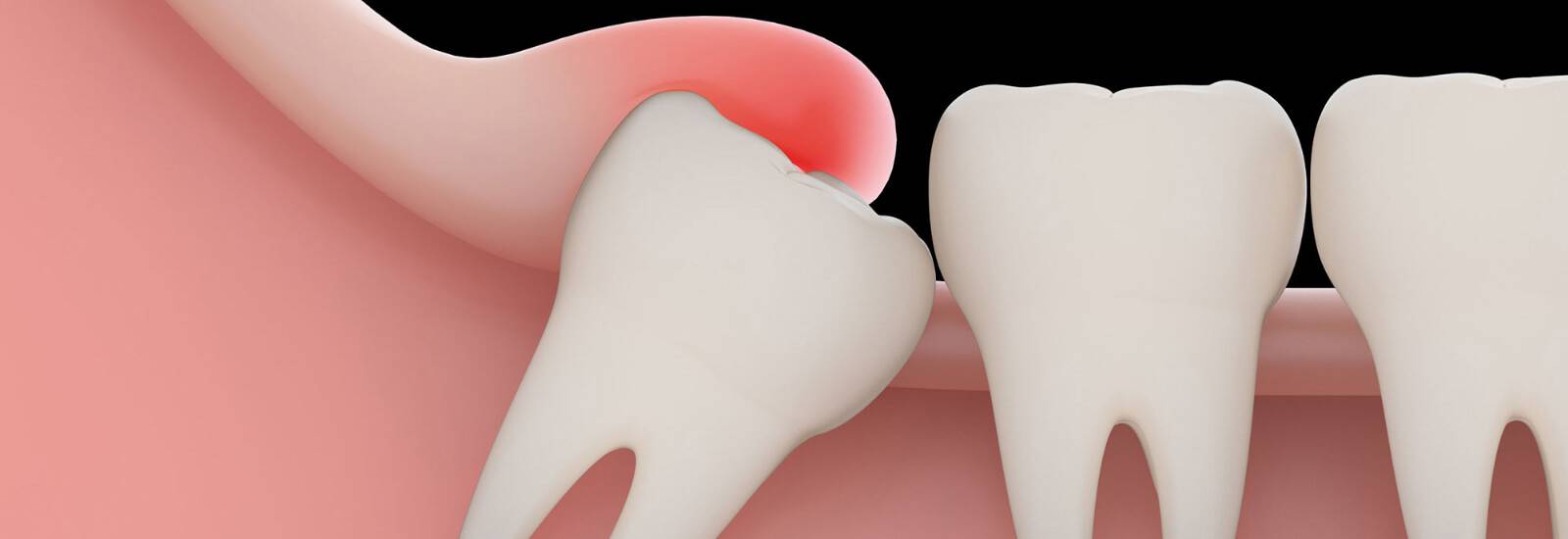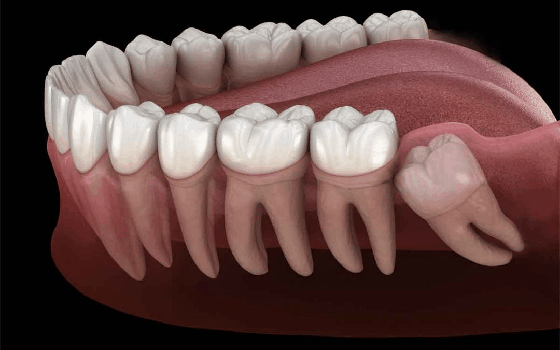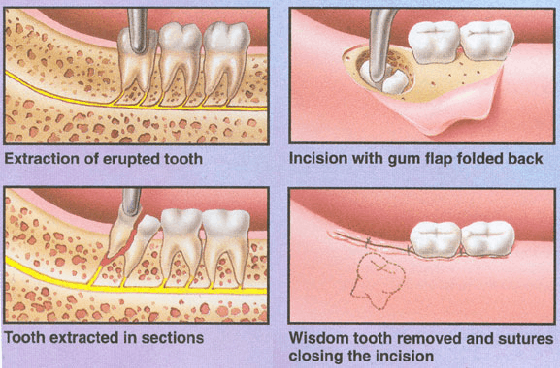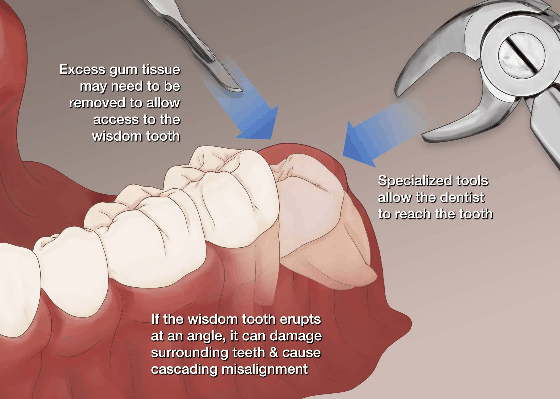Wisdom Tooth Extraction
Wisdom teeth are the last 4 sets of teeth that erupt in the mouth in a lifetime. Excruciating pain is generally experienced by most people during its eruption. The decay caused due to complexity while brushing or smaller spaces during the eruption are the main reasons for the pain. Depending on the situation, the impacted tooth is removed or treated.

Talk to a Dentist Now!
Table of content
- Why are wisdom teeth called wisdom teeth?
- What does wisdom tooth extraction involve?
- What is the reason for removing wisdom teeth?
- What does an impacted wisdom tooth feel like?
- What is the use of wisdom tooth?
- How do they remove impacted wisdom teeth?
- How do you take care of your mouth after wisdom tooth removal?
- What is the best thing to eat after getting wisdom teeth out?
- When is wisdom tooth extraction needed?
- When to call your dentist or surgeon?
- How to find a Dentist?
Why are wisdom teeth called wisdom teeth?
Wisdom teeth are the last molars in the human dentition. Usually, these teeth erupt at age 17-20. It is called a wisdom tooth because it erupts at a mature age. However, they do not have any role in the food-biting process.
They can be seen or spotted through the X-ray. At Sabka Dentist X-ray is done free of cost.
What does wisdom tooth extraction involve?
The wisdom tooth is the last set of 4 teeth that erupts in the mouth, which is comparatively larger. These teeth sets are also called molars, and they usually erupt between the ages of 17 years to 25 years. The eruption and growth of the wisdom tooth may lead to pain. A broken wisdom tooth also causes pain, and proper treatment is needed.
Wisdom tooth extraction is a surgical procedure to remove the impacted tooth which is placed at the back. If an impacted wisdom tooth causes pain or other oral issues the dentist will advise to remove the tooth.

What is the reason for removing wisdom teeth?
- They’re impacted. Because they are so far back in the mouth, wisdom teeth may not come in normally. They can be trapped in the jawbone or gums, which can be painful.
- They come in at the wrong angle. They may press against the other teeth.
- Your mouth isn’t big enough. The jaw has no room for an extra set of molars.
- You have cavities or gum disease. It may not be able to reach your wisdom teeth with your toothbrush or dental floss.
What does an impacted wisdom tooth feel like?
Usually, a wisdom tooth is associated with the following issues. You can relate to them if you have any one of these:
- Pain: When an impacted wisdom tooth tries to come out, the top of the gum can become infected and swollen. At this time you will feel the pain. You will start to recognize the referred pain in nearby areas such as surrounding teeth, ears, etc.
- Pericoronitis: Inflammation of the gingival flap around wisdom teeth is common.
- Food impaction: Due to the hindmost positioning of wisdom teeth, food impaction is common here. Hence it increases the risk of building cavities.
- Tooth misalignment: When wisdom teeth do not have much space, they start to push the teeth beside them.
What is the use of wisdom teeth?
This tooth helped human ancestors to grind plant-based tissue. But as humans evolved our diet changed. The soft diet made the jaws less forward growth. This adverse effect resulted in less space for wisdom teeth.

How do they remove impacted wisdom teeth?
When you visit the clinic the dentist will thoroughly check your mouth. The examination allows them to understand the complexity of the case. Then he/she will start the treatment
- Anesthesia: Before having wisdom teeth removed, you will be given an infusion of anesthesia nearby to numb the tooth and encompassing zone. In case you are especially restless about the methodology, your dental specialist or specialist may give you a narcotic to enable you to unwind. This will for the most part be an infusion into your arm. A general sedative is rarely required for sharp tooth evacuation. It is possibly sometimes utilized when the strategy is completed in an emergency clinic. Nonetheless, for this situation, you should in any case have the option to return home on a similar day as the method.
- Tooth Extraction: when you start to feel numbness in the jaw and cheek area, the dentist will then extract the wisdom tooth. You will not experience pain while removing the tooth. But you may feel a little pulling pressure. The dentist will place a medicated gauze against the extracted wound to stop the blood flow.
After extraction, the numbness may stay for 30 minutes to 2 hours. You may feel little or no pain after the extraction. Your doctor may advise you to stop chewing the food on that jaw side. Apart from this, you can do your normal activities.
How do you take care of your mouth after wisdom tooth removal?
- Bleeding management: Blood flow is a common effect after an extraction. Stop excessive spitting during this time. Placing a gauze over the extraction site can help to relieve the blood flow.
- Pain management: Wisdom teeth removal pain is one of the unavoidable features. Your dentist will prescribe the necessary painkillers. Normal pain will be solved by painkillers. If you still have pain you can contact Sabka Dentist Clinic regarding the pain problem.
- Swelling and bruising: Swelling of your cheeks usually improves in two or three days. You can use an ice pack as directed by the dentist.
What is the best thing to eat after getting wisdom teeth out?
- Avoid Beverages: Avoid alcohol and caffeinated drinks in the first 24 hours of the treatment. Don’t drink with the straw. Drinking with a straw may lead to dislodging the blood clot from the chamber.
- Food: Soft food consumption is advised during the first 2-3 days. You can start to eat semi-soft food when you can tolerate them. Hard chewy foods can be stuck in the wound and irritate the extracted area.

When is wisdom tooth extraction needed?
At the point when knowledge teeth cause issues, or X-beams show they may down the line, they have to come out. Other valid justifications to take them out include:
- Harm to other teeth: That additional arrangement of molars can push your other teeth around, causing mouth torment and chomp issues.
- Jaw harm: Cysts can conform to the new teeth. On the off chance that they aren’t dealt with, they can dig out your jaw and harm your nerves.
- Sinus Issues: Problems with shrewdness teeth can prompt sinus torment, weight, and blockage.
- Excited Gums: Tissue around the zone can grow and might be difficult to clean.
- Depressions: Swollen gums can make pockets between teeth that assist microbes with developing and holes structure.
- Arrangement: Impacted insight teeth can cause issues with swarming of other teeth and even make treatment to fix other teeth important.
When to call your dentist or surgeon?
- When you feel difficulty in breathing and swallowing
- Excessive bleeding
- When you feel severe pain even after having the painkillers
- If you find swelling is not curing after 2-3 days.
- Pus in the extracted area
How to find a Dentist?
At all Sabka dentist clinics, Wisdom tooth extraction treatment is available. You can find the nearest clinic to your location on our site. Or you can call us directly to book an appointment.
Some people are looking for lesser impacted wisdom teeth removal costs, so they can make a quick decision about its extraction.
If you want wisdom tooth removal at a lesser cost, then you must approach Sabka dentist. They can extract the wisdom tooth at a comparatively lower cost.
Sabka Dentist specializes in carefully removing the wisdom tooth to utmost comfort. They will guide you properly for the care to take after wisdom tooth removal.
Expert's Opinion
- Dr. Ankita Gada Dental Director of Sabka Dentist says “Wisdom teeth are the last 4 teeth (third molars), two in each jaw. They erupt in the mouth between the ages of 18 and 25.”
- Dr. Priyanka Shingore Dental Director of Sabka Dentist says “Sometimes, they may not have enough room to erupt or develop normally. This will cause the third molar/ wisdom tooth to be impacted. Impacted molars may result in pain, swelling, bad breath damage to other teeth, and other dental problems. Thus, impacted wisdom will need extraction.”
- Dr. Reena Waghela Dental Director of Sabka Dentist says “Also, due to its hindmost positioning in the jaw, there might be difficulty in brushing or flossing, which makes it more prone to decay. Thus, if the third molar has grossly decay, it is necessary to extract it.”
About Author

Dr. Jena after graduating as a Dental Surgeon in 2007 she started working under a well known private practitioner as an associate Dentist. After one and a half years of experience in private clinic she joined a reputed trust Total Dental Care in january 2010 and continues her work with us till the time it got converted into a large dental chain SABKA DENTIST.
Dr.Jena is associated with SABKADENTIST from the time of its inception. Initially she worked as an associate Dentist and was promoted to the post of Dental Director in August 2011. Initially she was given a responsibility of handling many operations of the clinic. Her hard work paid off when she was ultimately given the charge of Audit and Compliance of all clinics of SABKADENTIST across 5 cities. Her solitary goal is to put the company on the peak through stringent Audit and Compliance.
Frequently Asked Question
What are the causes of the pain during the wisdom tooth?
- They are larger compared to the other types of tooth, which causes strain on the gums
- Neighboring tooth makes it difficult to grow, which causes pain
- It also exerts pressure on the neighboring teeth impacting the areas near the wisdom tooth.
How to relieve wisdom tooth pain?
On some occasions, the dental expert may suggest some medicines to get relief from the pain temporarily. However, in most cases, dental experts suggest wisdom teeth removal surgery for getting permanent relief from the pain.
How long does pain after wisdom tooth extraction last?
During the extraction of the wisdom tooth treatment, dentists generally numb the region by giving you a local anaesthetic. So, there will be no pain experienced to you during the removal of the wisdom tooth. However, there are possibilities of pain after some duration when the effect of local anaesthetic finishes. So, you might feel some pain after the removal of the wisdom tooth.
Time to fully recover from a wisdom tooth extraction?
After your wisdom tooth extraction surgery, it might take you up to 2 weeks to fully recover. After the Surgery, for the first few days. You might have swollen mouth and cheeks but will be gradually improved as it heals. Use an ice pack for the first few days then switch warn water pack.
Is wisdom tooth removal painful?
No, wisdom tooth removal does not hurt. You should feel no pain during the treatment. After the Surgery, you might feel a little discomfort. But with proper care and rest, you will be back to normal in one week.
What to do for a speedy recovery after wisdom tooth extraction
- Get proper rest.
- Take your medicine as directed by your dentist.
- Use ice packs for the first 48 hours, then switch to a warm water pack.
- After 24 hours have passed, rinse your mouth with warm salt water several times a day.
- Avoid hard food for a couple of days switch to soft food.
Things to Avoid After Wisdom Teeth Removal
- Don’t use Hard brushes and avoid brushing near the extraction sites.
- Don’t eat any hard foods and avoid crunchy or chewy foods.
- Don’t use a straw for a drink.
- Don’t smoke or drink alcohol.



